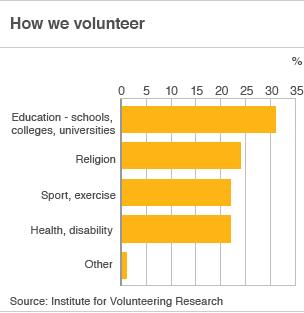How do you find time to build the Big Society?
- Published

The prime minister wants to build a "big society" by getting volunteers to run services. With our work-life balance already under pressure, how do those with busy jobs and families find the spare time?
OK, so you'd like to give something back to the community. You want to improve the lot of your fellow citizens. Well done.
But first you have to commute to work, put in a shift and trudge back home.
Then the kids need feeding, the dog needs walking and the house needs a clean... and already, the day is almost over.
David Cameron says he wants to rebuild Britain by harnessing "people power" - getting volunteers to run post offices, libraries, transport services and shape housing projects.
But if surveys are to be believed, it may be that the biggest obstacle to his plans may not be his political opponents, but the 24-hour clock.
A 2007 survey for the Cabinet Office (PDF), external found that 41% of those who had stopped volunteering had done so because they did not have enough time.
Likewise, a 2009 poll by the Hansard Society, external asked people who did not feel that they have an influence in decision-making - but who wanted to be involved - what was stopping them. Some 40% cited lack of time as the main reason.

But is the issue really lack of time - or lack of time management?
Certainly, it is hardly surprising that people blessed with an abundance of free afternoons and a lack of financial pressures - that is, those who tend to be both older and better-off - find it easiest to be good citizens.
One recent study (PDF), external concluded that those who participate in local decision making "generally are more likely to be white, older, better educated, richer, middle-class males" while volunteers were typically "women, of higher social grades, in managerial positions, degree educated, and middle aged".
However, there are many who face the normal pressures of work and family - yet still manage to devote hours each week to their communities.
Their capacity to volunteer begs the question: how can the government motivate those who are not currently volunteering to do so?
Recent schools of academic thought have suggested that individuals can be gently coaxed into doing so if they are given the right frameworks.
The writer Clay Shirkey has evangelised for the collaborative and collective potential of the web through crowdsourcing.
The book Nudge by Richard Thaler and Cass Sunstein, which argues governments need to give people better incentives to do the right thing, has been cited as a major influence on Cameron's Conservatives.
Manchester University's Professor Peter John has been involved in a project to road-test this theory - for instance, increasing book donation in libraries by 22% after publicly displaying donors' names, and attracting 63 volunteers in one community by asking everyone who rang a call centre if they wanted to help out.
"I think it's all about giving people a nudge in a way that recognises how they live their lives," he says.
"Very often, it's not that people don't want to volunteer - it's that they haven't been asked."
Whether the government can successfully harness this approach in its bid to build the big society is, of course, one of the key criteria on which it will be judged.